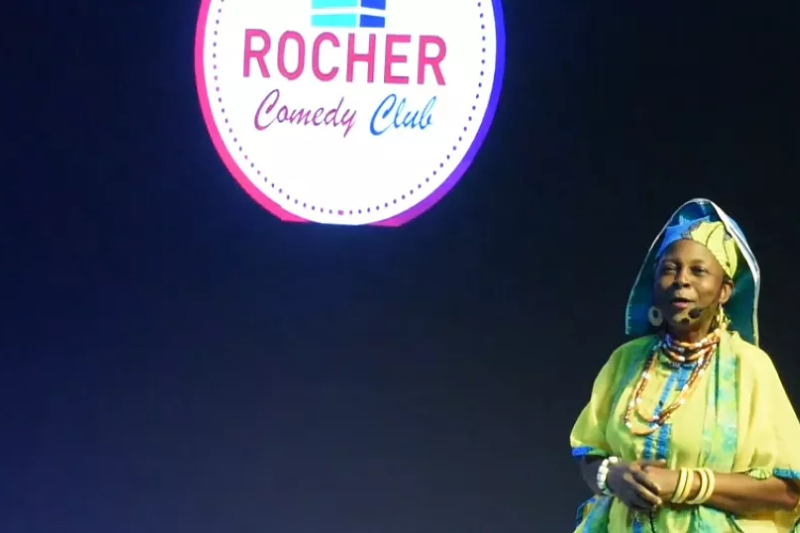Driven by women who are using humor as their weapon, a revolution is under development right in the middle of Africa. Traditionally a field dominated by men, stand-up comedy is seeing a boom of gifted female comedians shattering stereotypes, increasing awareness, and pushing women’s empowerment. Among these pioneers is the well-known Congolese comedian Germaine Ololo, who is reinventing African comedy’s scene.
Germaine Ololo: A Voiceless Advocate
The performances of Germaine Ololo offer potent commentary on urgent social concerns, not only entertainment value. Ololo addresses issues like forced marriage, abuse against women, and the suffering of widows—topics sometimes forbidden in many societies—using her keen wit and courageous manner. Her capacity to include comedy in weighty conversations helps her attract a large audience and cause laughter when considering important problems.
Ololo’s influence transcends her presentations. She is a mentor; hence, she is quite important in raising the next generation of female comedians. She invites young artists to the International Festival of Women’s Speech (Fief) offices every week so they may work on projects and get ready for events. These lessons are about discovering methods to use their craft to support women’s empowerment as much as about improving their comedic abilities.
“That’s what art is all about—enhancing everyday language to convey a message. Whether it’s sharing stories, performing slam poetry, or stand-up comedy, public speaking now must be a tool to educate, Ololo notes. Her viewpoint emphasizes how transforming comedy can be in pushing public education and societal transformation.
Stand-Up Comedy: A Growing Stage for Women
Defined by its theatrical form of hilarious monologue, stand-up comedy is becoming more and more well-known all throughout Africa. As more women regard the stage as a forum to express their opinions, question society standards, and motivate others, the number of women comedians is rising.
One such source of inspiration is Ivorian comic Prissy la degammeuse, who lately took part in the Stand Up au Feminin event at Pointe Noire. Held from March 8 to March 10, the event honored the artistic and cultural achievements of female comedians as well as their skills.
“To be very honest, I am still moved and am rather thrilled. Reflecting the effect of the festival on both the audience and prospective comedians, one visitor said, “I was able to get on stage today and even talk a bit to Prissy.”
Comedian Alex Cadi, another emerging talent, says she enjoys stand-up comedy “because through it, I can share my ideas and my vision.” For many women, standing up is not only a job but also a way to express themselves and change society’s impressions.
Keep Reading
The Part Festivals and Cultural Projects Play
Encouragement of women’s involvement in comedy and the arts depends much on cultural projects and celebrations. For example, the Stand Up au Feminin festival offers female comedians a stage on which to highlight their skills, network with colleagues, and become noticed. Such gatherings are crucial for creating a network that supports women’s development in the sector and for encouraging the expansion of female expertise.
Congolese civil society organizations find great resonance in the topic of 2024 International Women’s Day, “Invest in Women: Accelerate Progress.” These groups want more help for projects headed by women in the cultural sphere. They underline that more general social and economic development depends on women investing in arts and culture, in particular.
A movement acquiring velocity
Rising women in stand-up comedy in Africa is a movement gathering pace rather than merely a trend. Along with providing entertainment value, these comedians challenge preconceptions, support gender equality, and inspire the following generation of women. By means of their art, they are significantly enhancing the social and cultural fabric of the continent.
The scene of African comedy is changing as Germaine Ololo and colleagues keep shattering stereotypes and clearing the path for the next comedians. Their performances and narratives serve as potent reminders of how art can inspire change and empower local communities.

